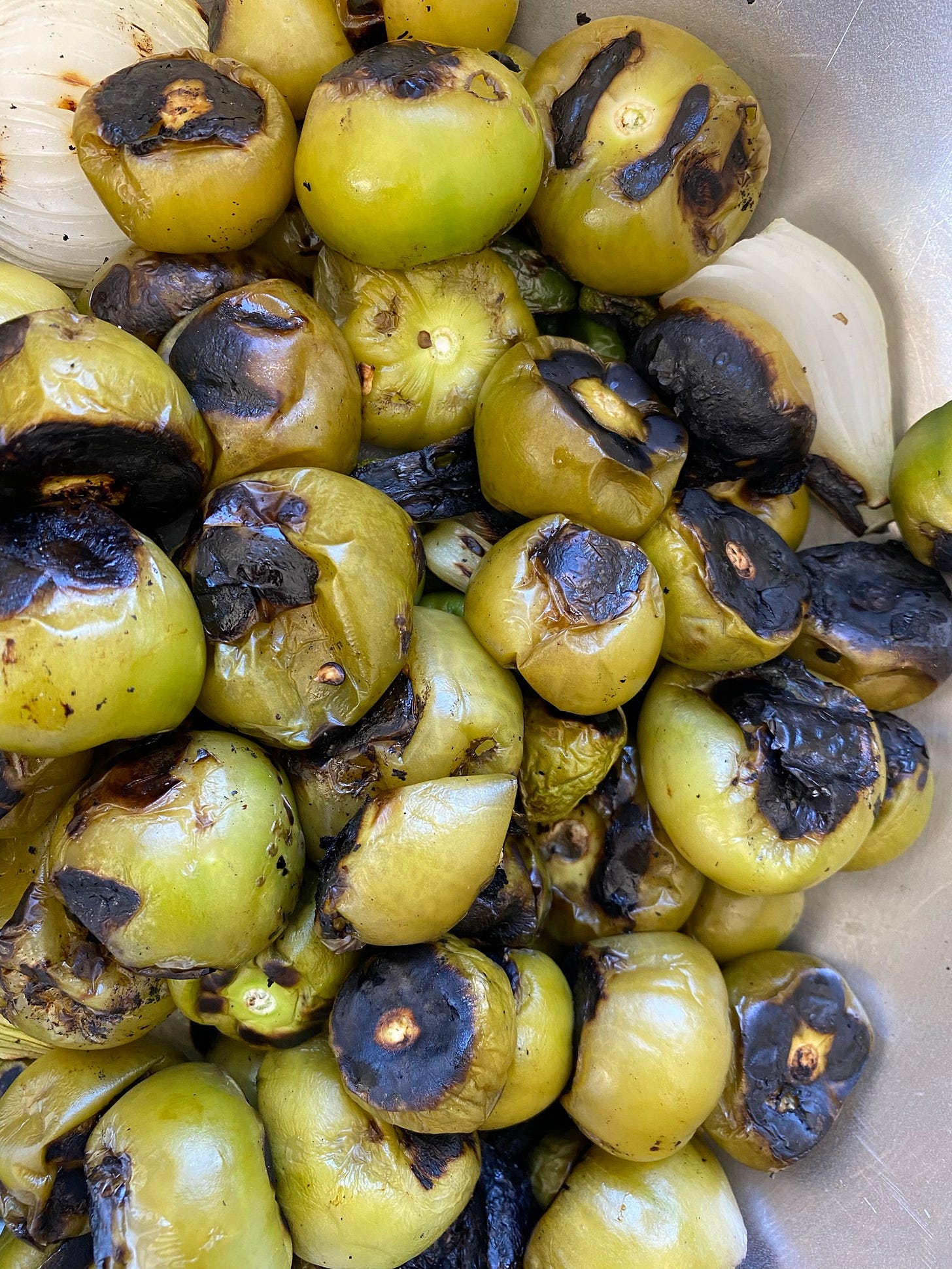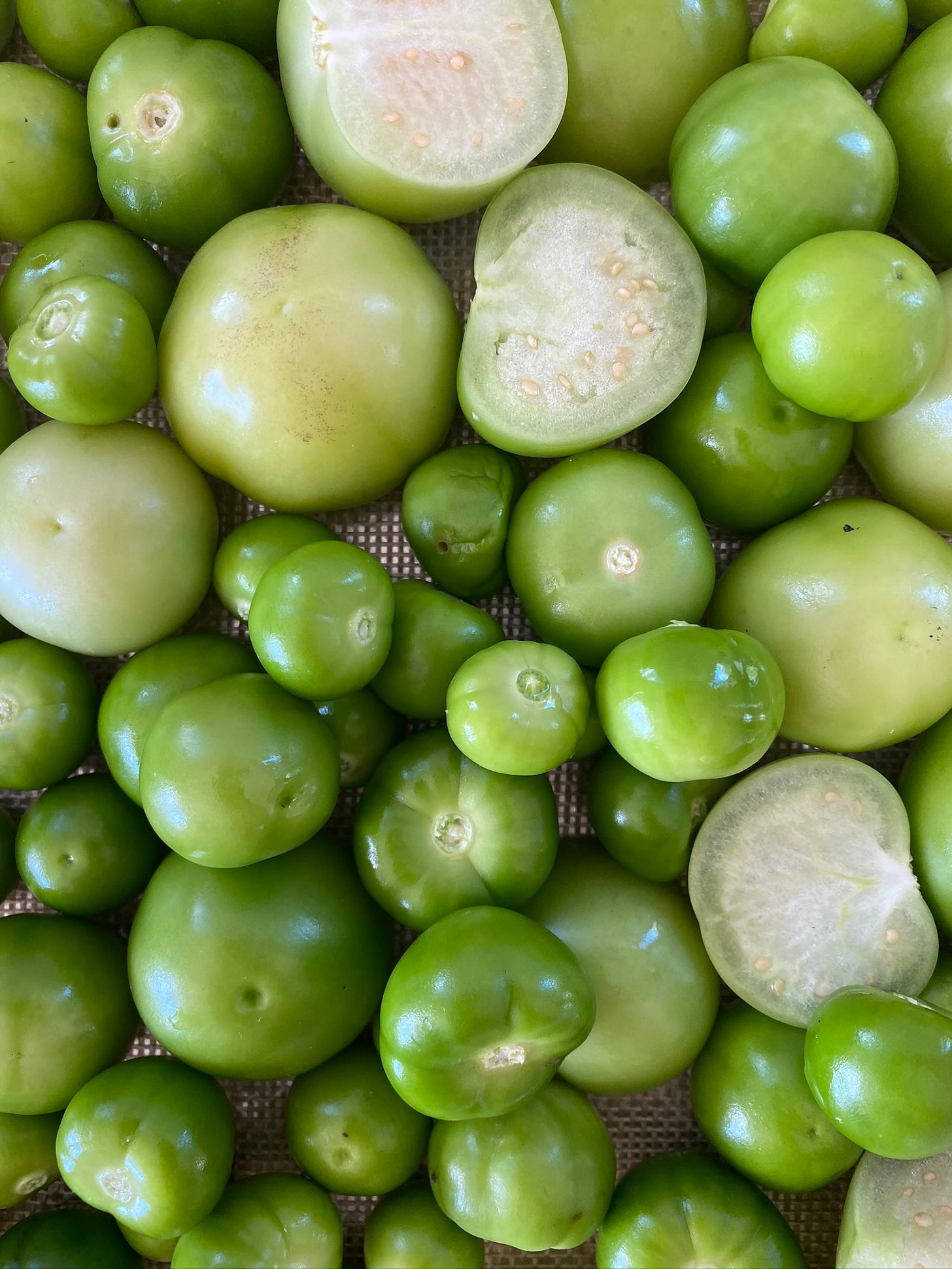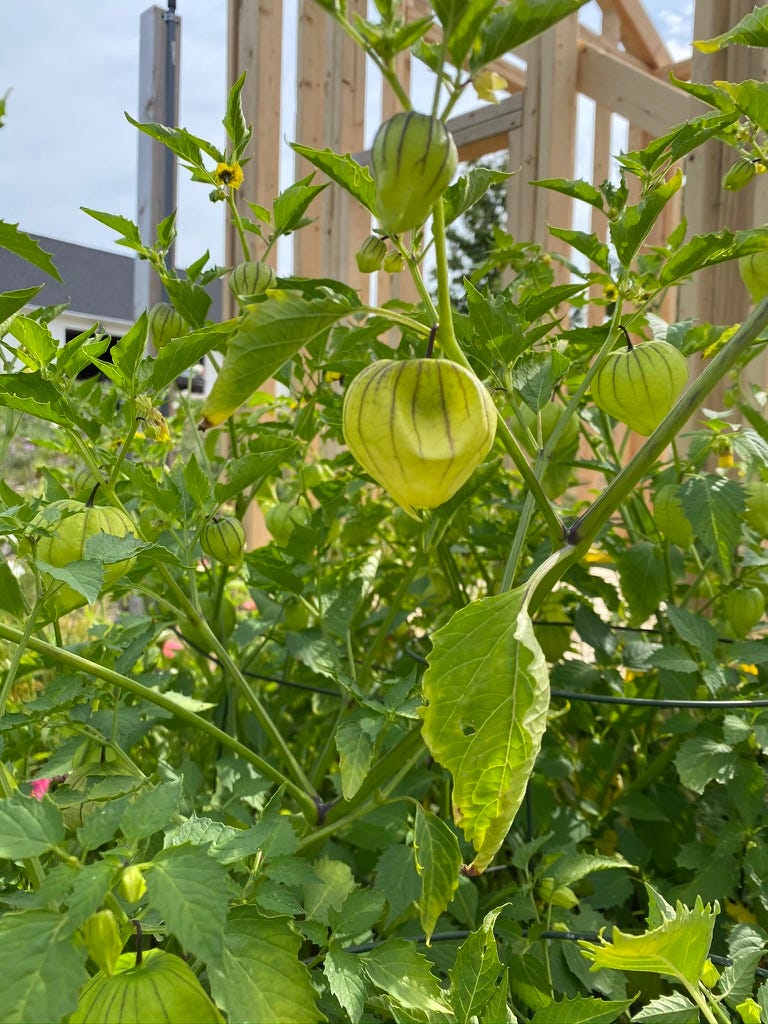The Gift of the Tomatillos
Sometimes veggies can speak their own language when words aren't enough
Growing up, I had no idea what a tomatillo was. If you don't know, they grow like lanterns on a rapidly expanding plant that nearly grows overnight in summer heat. They are like weeds now as I trim branches and harvest a basket of them. The lanterns contain the sticky fruit that, when roasted over a fire, is a mix between a green tomato and a sweet fruit. They are truly unique and a staple to Central and South America cultures to make salsas raw and roasted to add to dishes.
On this cool August day, I bring in the basket from our garden, fill a giant bowl with cold water, and head to shuck the tomatillos to prep to make my favorite roasted tomatillo salsa with avocadoes. I didn’t always know how to shuck tomatillos without getting resin all over my fingers. In my high school years I actually learned firsthand in a hot kitchen in southern Michigan from a woman named Margarita, not just how to process tomatillos and what they were, but how a vegetable can help us speak without words.
In high school, I was a very active soccer player. I dreamed of landing a major scholarship with a Big Ten team in Michigan and playing at an elite level. Soccer was my entire world outside of art. My small town didn't offer me many opportunities that challenged my skills, so I spent many days doing it alone after my job at the local grocery store. Many evenings a group of young guys from high school swung by and played at the end of the field where I was practicing. We didn't talk because our differences separated us. I was the local white girl, and they were all from various parts of Central America and spoke only broken English. We knew each other from passing in the hallways of our high school, but that was all we felt we had in common besides our love for how the ball felt next to our feet. One warm summer day, one of the boys came over and invited me to pick up on a game with them. This budded a new chance to play at a level I desired, but it also opened the door to new relationships.
One of the boys became more than just someone I met for soccer, but we fell in love. He came from a different world than me. I had envied his skills and the way he moved on the ball. Playing soccer with him was exciting and challenging in every way, but it connected us but our difference were clear. Somehow though soccer bridge it all and my northern Michigan white cultured self of the midwest found herself enthralled with this boy 2 years older than her who came from Mexico. He was one of five kids and 25 cousins who had slowly made their way here after their uncle worked tirelessly to help them build a new life in this factory town on the border of Indiana. He came here in the bed of a truck at night as a child, and I was born to a family that had more privilege than I even knew. Despite it all, that summer we fell in love and he was my first kiss, which budded into 2 years of learning a new culture and language because he meant that much to me and I to him.
My summer days that year involved playing soccer and learning his culture. He slowly introduced me to his family, and I learned quickly how it was a huge thing for him to do this. I barely spoke any Spanish, and his family spent their weekends with soccer blaring on the TV, Corona beer in a cooler in the living room, and plenty of words being yelled in Spanish at the TV that I would soon begin to understand.
There was never any doubt that love existed in those walls, but so did hard work and the ability to survive in a new world.
The first time I visited, my boyfriend's mother graciously welcomed me in, but it was evident her skepticism was high about me as I stood there in her Dining Room in my soccer attire, fresh off the pitch. The walls of their home were an ode to their life back in Mexico that they missed. There were marks of their faith and layers of stories of all of their loved ones. There was never any doubt that love existed in those walls, but so did hard work and the ability to survive in a new world.
My parents had taught me that the best way to connect is in the kitchen, so as my boyfriend headed to the couch with his brothers, cousins, and dad, I followed his mother to the kitchen. It was August. The kitchen smelled of completely new scents to me. There was coriander, fresh cilantro, slowly cooked beans, and spices I would soon come to know well. It felt familiar because it smelled like him. His mother stood over a half-opac bucket of water with what I thought were apples. She jumped quickly back to making tortillas and, after a moment, noticed that I had followed her. She smiled. I knew we wouldn't be able to talk, but I wanted her to know I was willing to help. Our smiles and gestures made that clear to one another.
I went to the bucket and looked inside, and to my surprise, they were not apples but a husked fruit I had never seen before. I asked in my broken Spanish what they were, and she said “tomatillo” I was still confused, and she could tell. She then removed the tortillas she was cooking from the stove, dunking her arms deep into the bucket. She opened one under the water, revealed the fruit, pointed to other fresh ingredients, and said, "Salsa verde." I then realized what they created. She then pointed to me to do what she did and offered me the task, which I now know wasn't glamorous but a moment of connection. She then watched as I repeated the task. I dunked, peeled, and placed the fruit in the bowl she gave me. She then showed me why the water was important and what happens when they are not wet. I laughed, and so did she. I then took over the task, and she flipped tortillas. It was quiet between us in the humble kitchen where they cooked for all those she loved. The silence between us in words was filled by the sounds of learning our newly found connection.
Our cultural differences were apparent, but that day over tomatillos, it changed. A bridge was crossed, and I expanded my views, and so did she.
In a nonverbal way that day, she taught me an important skill in that hot kitchen that smelled of tortillas, slow-cooked beans, and smells that were unfamiliar to my life, but soon became nostalgic of the time I first fell in love with a boy and his culture. I saw how a vegetable can connect people despite the culture and story that had brought them together. She showed this to me the moment I husked the tomatillos in the kitchen while she cooked tortillas. I learned how vegetables and food many times are best taught through experiences and relationships.
Dating her son, I know, wasn’t easy for her to handle. A white girl coming into her home felt foreign and maybe even scary. Our cultural differences were apparent, but that day over tomatillos, it changed. A bridge was crossed, and I expanded my views, and so did she. That is what food does… it connects us, and we expand because of cooking and eating together. It allows us to enter another’s culture and story through knowledge and flavor.
Her son and I didn't work out. Our cultures ultimately divided us over time. He knew I would never be happy with the expectations of his culture. I was too strong-willed and independent. He felt the expectations and pull of his culture. It wasn't meant to be, but we made it work for quite some time. I still often think of his family as they became such a huge part of my life in those years, even after our relationship ended. I played many soccer games with his cousins, and my parents knew all of his family too. We attended many cultural celebrations amongst their family for years and felt we found a community in a place we lived for a short time away from our family. We made a beautiful connection because of a sport and a lot of great food.
As I harvest my tomatillos this year, I think about Margarita and how she husked those tomatillos. I think of how she let me experience her worldview for a moment. As I dip my hands in and peel away the husk on this hot day, I remember that hot day when the soccer game was played in Spanish in an un-air-conditioned home. I can remember setting my cleats by the door and being there in my soccer shorts and shirt with my hands deep in a bucket of water full of tomatillos, not knowing that years later, I would grow my own or even what life would look like for me past 16 years old. It all feels as real as these tomatillos I hold in my hands now.










I have been following you on Instagram for nearly 10 years, I think, but am new to these beautiful essays. I have always considered my self to be a good gardner, but your collective knowledge, tips, randoms, and creative flair have elevated my connection with nature and the gardens. This year's perennial beds are stunning. Your little voice is in my head every stinkin' time I try to improve my companion planting. Thank you!
Beautiful, Megan. Thank you for sharing such a precious memory!